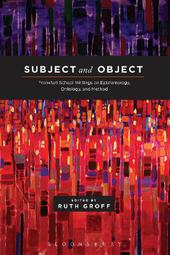
|
Subject and Object: Frankfurt School Writings on Epistemology, Ontology, and Method
Paperback / softback
Main Details
| Title |
Subject and Object: Frankfurt School Writings on Epistemology, Ontology, and Method
|
| Authors and Contributors |
Edited by Dr. Ruth Groff
|
| Physical Properties |
| Format:Paperback / softback | | Pages:328 | | Dimensions(mm): Height 229,Width 152 |
|
| Category/Genre | Social and political philosophy |
|---|
| ISBN/Barcode |
9781441122865
|
| Classifications | Dewey:301.01 |
|---|
| Audience | | Tertiary Education (US: College) | | Professional & Vocational | |
|---|
|
Publishing Details |
| Publisher |
Bloomsbury Publishing Plc
|
| Imprint |
Bloomsbury Academic USA
|
| Publication Date |
19 June 2014 |
| Publication Country |
United States
|
Description
Subject & Object is a thematic collection of classic works by Max Horkheimer, Theodor Adorno, and Herbert Marcuse, designed to foreground the authors' philosophical concerns, especially in the areas of epistemology, ontology, and method. The volume, which includes lucid introductions to all of the selections, illustrates Frankfurt School approaches to questions such as the nature of reason; the limits of empiricism, pragmatism and Kantian transcendental idealism; the case for materialism; the difficulty of thinking counterfactually; and the ideological character of mainstream social science. Many of the pieces in the volume are otherwise out of print. Subject & Object will be a resource for social, political, and cultural theorists who may be less familiar with the philosophical aspects of the Frankfurt School, for analytic philosophers who may not have had previous exposure to their work at all, and for anyone wanting access to these seminal texts.
Author Biography
Ruth Groff writes about the metaphysical infrastructure of social, political and moral thought and of theories of agency. She teaches at Saint Louis University, USA.
ReviewsRuth Groff should be congratulated for bringing together these seminal texts from the 'inner circle' of the Frankfurt School. They shed light on the purposes of critical theory and its salience for the present. Professor Groff has done the entire intellectual community an important service. * Stephen Eric Bronner, Distinguished Professor of Political Science, Rutgers University, USA * Ruth Groff's anthology is an important contribution for those of us teaching the writings of the so-called 'early Frankfurt School'. Bringing together in one anthology such groundbreaking texts as 'Subject and Object,' 'Means and Ends,' and 'Negative Dialectics' makes this a worthy enough project. But Professor Groff's entirely lucid introductory abstracts are what makes this an invaluable book. Strikingly clear, Groff's writings are absorbing and memorable reads on their own account. * Catherine Kellogg, Department of Political Science, University of Alberta, Canada * The next time somebody tells you that critical theory is inattentive to objects-that all it cares about is culture, language, discourse, and codes-this volume is how you show them that they're wrong. The essays collected here draw our attention to a negative dialectics that has as much in common with Bruno Latour and Quentin Meillassoux as it does with Derrida and Foucault. The realists, materialists, and ontologists come knocking at the gates of Frankfurt. * Christian Thorne, Williams College, USA and author of The Dialectic of Counter-Enlightenment * This invaluable collection offers a nuanced, well-reasoned approach to questions of epistemology, ontology and method from the first generation of Critical Theorists that insists on "determinate" rather than "abstract" negation, situating these questions within the broader historical and social contexts from which they emerge. Ruth Groff's pithy introductions of each of these seminal essays, moreover, are wonderfully illuminating without simplifying their central claims. * Samir Gandesha, Associate Professor of Modern European Culture in the Department of the Humanities and Director of the Institute for the Humanities at Simon Fraser University, Vancouver, Canada *
|